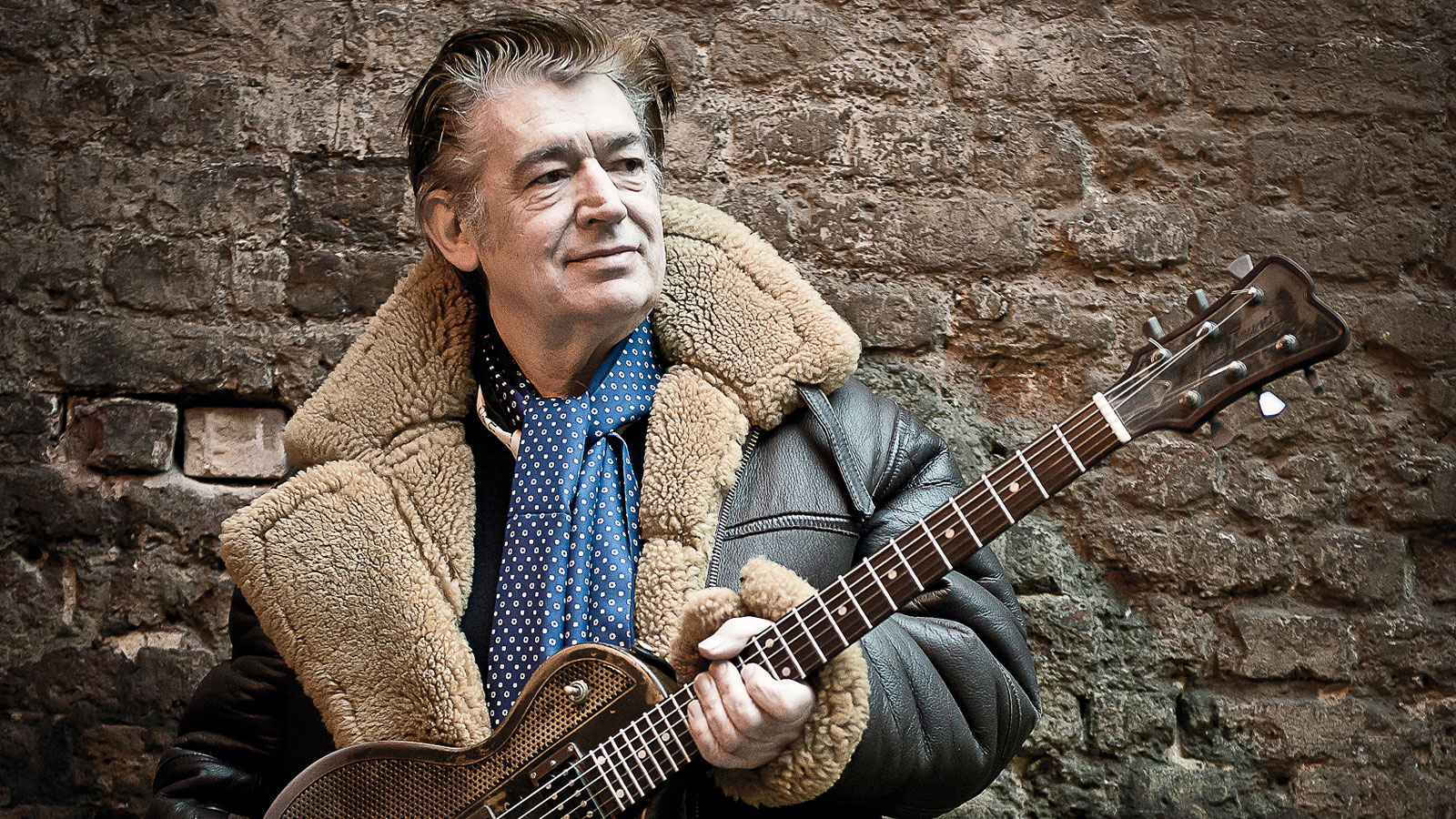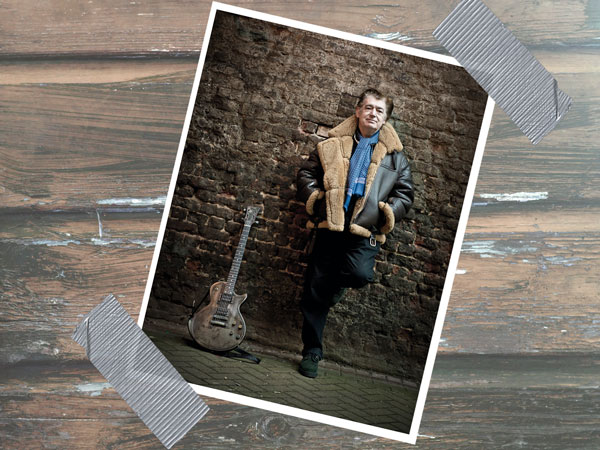Chris Spedding's 10 lessons learned from a life in guitar
The session pro on recording, repertoire and rhythm playing

British session ace Chris Spedding gives us some insight into the life lessons, creative approaches and techniques that have helped shape his in-demand axe stylings.
Chris Spedding has packed so much into his 50-plus-year career that we'd pretty much need the whole of this mag to catalogue it all.
After building a rep as one of the UK's best jazz players during the 1960s, Spedding went on to become one of London's most sought-after session guys in the 1970s.
Over the past five decades, he's variously cut records and/or played live with artists and bands as diverse as Tom Waits, Bryan Ferry, John Cale, Paul McCartney, Nina Hagen, Jack Bruce, Shirley Bassey, Elton John, Robert Gordon and The Vibrators.
And then there's Chris's fretwork on Jeff Wayne's The War Of The Worlds (both on the original 1978 album and on the recent tours), his role as producer for the first Sex Pistols demos, playing in Sharks with the late Andy Fraser of Free, and the not-so-minor feat of cutting 13 solo albums since 1970 - not to mention being one of Mike Batt's Wombles!
Spedding's latest 2015 album, Joyland, is truly a sonic joy to behold, featuring guest appearances from Johnny Marr, Arthur Brown, Bryan Ferry, Glen Matlock and Andy Fraser, to name but a few. Welcome to Chris's world...
1. Playing jazz makes you think differently
"Because of my jazz phase, I tend to think of music and guitar differently. I don't think in a pentatonic blues way. I think more in scales and chords and I think that's what the jazz thing did for me.
Want all the hottest music and gear news, reviews, deals, features and more, direct to your inbox? Sign up here.
"If you give a lot of rock players a song in a certain key, like if you said, 'Play in A', then they'll just go to the A position on the guitar and they won't really move from there for a while.
"I think more linearly. I'll hear the music and I'll think, 'Okay, there's a few lines here' and I'll play those lines without being locked into the limitation of the I, IV and V."
2. Your head and your heart are as important as your fingers
"When I've been asked by players how they should go about improvising a solo on a particular chord sequence, I will say, 'Get into the habit of singing a note in your head and then see if you can find that note on the guitar. That's your first lesson. Then sing a very simple melody in your head and see if you can play that on the guitar.'
"If you can sing the thing in your head and play it with your fingers, then you're creating music"
"If you can sing the thing in your head and play it with your fingers, then you're creating music, and it's not music that's limited to the fact that you know that the A chord is there and these notes belong in the A chord. You have to know scales and you have to know what they sound like, but it's all about going from your head through your heart down to the end of your fingers so it comes out as music.
"That's the technique that I advise people to try and follow, and I think that's what I learned from the jazz thing. And never forget that it might start in your head or in your ears and it might end up through your fingers - but try and make sure it always goes through your heart!"
3. Learning a big repertoire helps your songwriting
"[In the mid-1960s], I played with the Nat Temple Band. There were all these guys in their 40s and I was barely 20 years old. It was in the days when you would play selections from all the shows for diners.
"You had to have such a wide repertoire of standards. You had to know your Cole Porter songs, your Irving Berlin songs, your Richard Rodgers songs and your Hoagy Carmichael songs. But, after you'd learned your first 300 songs, the rest of them were really easy because you realised what the formats were.
"Some of them of course weren't to a format, but that was fine, because you were able to assimilate them because you'd worked so hard learning those first few hundred. The penny suddenly dropped and you could see how the chords were going and you'd immediately know what the next chords were.
"When I came to write my own songs, it was as if I'd done a course in songwriting. I knew how writers put together their songs - Burt Bacharach, Lennon and McCartney, Ray Davies and all the great songwriters. Your tools of the trade were right there because you'd studied with the best."
4. George Harrison would have been the ultimate session man
"When I'm on a rock session and I've got to come up with a nice riff or I need something to point the song into the next bit, I always think to myself, 'What would George Harrison have done on this?'
"Everybody just assumed that I was a fantastic sight-reader, but I used to have to fake it sometimes!"
"You can't hear those Beatles songs without hearing his licks, like Please Please Me. You've got to have the lick that goes 'dah dah dahdah da da da'. He made the next bit stand out and he did it with just three notes. I always think, 'How can I do that kind of thing on this song?'
"He is kind of a model for me because he was such a good player - very imaginative and melodic with a wonderful sense of time, sense of tone and sense of structure. All his little solos were short and sweet and to the point, and very rarely do you hear him just play a lick that's just a lick. They were always crafted for the moment."
5. Reading music doesn't always make you better
"I lived the session-guy lifestyle from about 1968 to 1978, except for a two-year gap from '72 to '74 when I was in Sharks. It was pretty full on... and it could be three sessions a day, seven days a week.
"I think, because I'd been involved with these jazz people like Mike Westbrook and Mike Gibbs, everybody just assumed that I was a fantastic sight-reader, but I used to have to fake it sometimes! I'd get on a session and if something was a bit difficult to read, I'd ask somebody to sing it and then I'd be able to play it.
"Sometimes the arranger would just go, 'That's exactly what I wanted but I didn't really know how to write it! You've really got the right sound...' A guy that was a really great reader would probably play a part a little bit too polite, whereas I'd just play it like a hooligan!"
6. A natural approach to tone gives you more control
"I tend not to use pedals. Live, I'll turn my [1970 Fender Deluxe Reverb] up to number 10 and work from the volume control on the guitar. When I want a fairly clean rhythm, it'll be on about number three and if I want to play a big overdriven solo, I'll just whack it up to 10.
"I do it more naturally I think, getting sounds with my hands rather than some sort of pedal"
"Most guitar players will have a pedal for distortion and they'll press a pedal if they want to change the sound, but I don't. I'll mute with my wrist for rhythms and, if I'm playing a solo and I suddenly want to go down really quiet, I'll mute it with my hand.
"I do it more naturally I think, getting sounds with my hands rather than some sort of pedal. I also have this anxiety about a connecting cord going wrong or a battery running out at the wrong time, so I don't have to think about any of that either."

7. Gigging with an orchestra necessitates gear changes
"When I recorded The War Of The Worlds [1978], I just used an amp and a guitar, but when I had to do the live shows, I had to do all these presets in order to recreate the sounds that were on the record.
"That was really weird, because I was the guy that did the original guitars and I know that I didn't have any pedals or any aids at all! I just plugged straight in and it was either loud or soft... but with the live shows we couldn't have amplifiers on the stage because we had strings and everything.
"Back in the 70s, you'd get sustain by just turning your amp up really loud, but we couldn't do that. On the first few [The War Of The Worlds] tours, I had great difficulty trying to get that sustain so I would just fake it, play the note again and hope nobody noticed. But then I heard about the Fernandes Sustainer and that worked really well."
8. Valuable guitars can be unplayable
"My main acoustic [including on new album Joyland] is an old [Gibson] J-200 from the 50s, which is the only old vintage guitar that I have. It's really nice and I fell in love with the look of that guitar when I saw Elvis playing one in the Loving You [1957] movie.
"That's one of those silly things about the value of guitars. If I hadn't had work done on my Gibson J-200, it would be unplayable"
"I got that at Rose Morris in Shaftesbury Avenue in the 70s for 300 quid. I had work done on it because the bridge was in the wrong place and needed moving, but whenever somebody looks at it and values it, they say, 'Well, if you hadn't had that work done, this guitar would be worth about 20 grand but it's only worth about three grand now!'
"That's one of those silly things about collectors and the value of guitars. If I hadn't had that work done, it would be unplayable because it wouldn't have played in tune!"
9. Playing slide parts in standard tuning makes things simpler
"I like playing slide quite a bit as well, but I nearly always play slide using a regular tuning instead of an open tuning. It's from the days of sessions when you would have something written and if you used [an open] tuning you couldn't read the parts because the notes are in a different place.
"Also, with that thing I was saying about using your head, your heart and your hands and singing something to yourself and then trying to play it... if you use an open tuning, you have to sort of re-learn where every note is. I do manage to achieve quite a bit without using a different tuning."
10. Rhythm parts are where the heart is
"When you do sessions, it's about 95 per cent rhythm"
"When you do sessions, it's about 95 per cent rhythm, so rhythm and playing riffs is what I enjoy the most. It might be the lead that hits you in the face, but most of my time spent playing has been working out those rhythm parts, and that's what interests me.
"It's so important getting rhythm parts to contribute towards the song as a whole. You shouldn't really be working too hard on the lead parts anyway, because they should be more spontaneous."
Chris Spedding's Joyland is out now on Cleopatra Records

